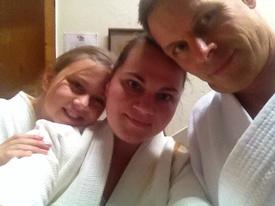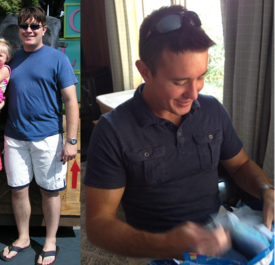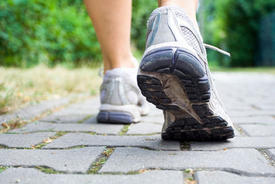Folks who have lost 50+ pounds

missylectro
Posts: 448 Member
Hi, I am posting here because I need to talk to people who have reached their goal weight and have lost 50 or more pounds.
I'm about halfway to my goal and find it's getting harder and harder to lose weight. Which is natural. So far I've been eating over 1200 calories a day (anywhere from 1300-1500, sometimes more which I found was hindering my weight loss). Now I want to try eating 1200 calories.
So I have a question, did eating 1200 calories a day help you when you stalled?
I'm about halfway to my goal and find it's getting harder and harder to lose weight. Which is natural. So far I've been eating over 1200 calories a day (anywhere from 1300-1500, sometimes more which I found was hindering my weight loss). Now I want to try eating 1200 calories.
So I have a question, did eating 1200 calories a day help you when you stalled?
0
Replies
-
I've never been able to do it for an extended period of time, but yes, when I could hang, it did help.0
-
So far I have lost 98 lbs. i always count calories and watch carbs. I calculated my calorie intake based off of losin 1 lbs per week. Dont cut your calories to much or it can def hinder your process. Sounds like your body is hitting a plateau. Best bet would be to switch up your workouts not cut down on the calories.0
-
I did not lose 50+ pounds, but I did lose 38. . .
1) What helped me when I stalled was to reset my goals on MFP. When you lose weight you need to drop your calories (not below 1200 though). MFP doesn't do that automatically very well. You need to manually go in and recalculate your calories to get the new number. Stopped my stall every time.
2) You do slow when you get close to your goal weight BUT you also just tend to log sloppier because it takes a LONG TIME to get there. Recommit to measuring and weighing and logging. It's the only way.
3) I also can't lose much unless my carbs are under 50% - 35% was my goal.
4) Exercise. I only walk but it adds a few hundred calories to my day and that makes it a lot easier to stick to my goals. I only had 1230 calories net at the end, but always got to eat a few hundred more than that because of exercise.
Good luck.0 -
I have really never eaten fewer than about 1500 calories a day (except for my first month or two, when I think my base calories were set at 1420).
As I've gotten closer to my goal weight, my rate of loss has slowed down, but I am still losing (with about 8 lbs to go, unless I drop my goal further), and the scale is heading in the right direction. During the times when I felt like I might be plateauing, I realized that I was slacking a little and not logging my intake as accurately as I had been, or that my activity level had decreased while my intake stayed the same. Once I buckled down again and was honest with myself, things started moving again. I use a food scale to weigh the majority of the food I prepare at home.
I think it's important to do some research so that you're well aware of your TDEE and your body's energy needs. Don't just pick a random calorie goal. Know your approximate maintenance level and what kind of calorie deficit you need to create to lose weight in a healthy and sustainable way. And as mentioned above, it's important to recalculate your body's calorie needs as you lose weight (generally every 10 pounds or so), because the less you weigh, the fewer calories your body needs to maintain itself.0 -
I have really never eaten fewer than about 1500 calories a day (except for my first month or two, when I think my base calories were set at 1420).
As I've gotten closer to my goal weight, my rate of loss has slowed down, but I am still losing (with about 8 lbs to go, unless I drop my goal further), and the scale is heading in the right direction. During the times when I felt like I might be plateauing, I realized that I was slacking a little and not logging my intake as accurately as I had been, or that my activity level had decreased while my intake stayed the same. Once I buckled down again and was honest with myself, things started moving again. I use a food scale to weigh the majority of the food I prepare at home.
I think it's important to do some research so that you're well aware of your TDEE and your body's energy needs. Don't just pick a random calorie goal. Know your approximate maintenance level and what kind of calorie deficit you need to create to lose weight in a healthy and sustainable way. And as mentioned above, it's important to recalculate your body's calorie needs as you lose weight (generally every 10 pounds or so), because the less you weigh, the fewer calories your body needs to maintain itself.
Is this a good calculator?
http://iifym.com/tdee-calculator/0 -
What has worked the most for me is weight training. When you lift weights your fat turns into muscle and you can still eat a reasonable amount of calories. While cardio is a necessary part of any weight loss program it can only do so much. There are countless ways to start with weights, but an easy one for me to start with is called 8 minutes in the morning- it has some simple exercises like leg lifts, crunches, etc....0
-
1200 calories a day and giving up all refined food made my weight loss start up again after a long stall. Of course, I'm a raving beeyotch much of the time.
 But I'm told the cravings and crankiness will pass.... 0
But I'm told the cravings and crankiness will pass.... 0 -
I had reached goal but then gained again. That said, the weight I am now I think is probably more appropriate for me anyway.
Lost well over 50 (even now I am more than 50 down from my heaviest) and I feel great.
Welcome friend requests from like-minded (or like-needs) folks.
I certainly have some stories.0 -
I have never eaten so little. I think at my lowest goal, I was netting 1400 calories. But I was also exercising 500 calories a day on average, so I was eating more like 1900.
There have been days when my net has been below 1200. Heck, there were 2 or 3 days when my net calories were negative (a 9-hour bike ride in the mountains will do that). But I compensated for those on other days in the week.
Bajoyba's advice is spot-on: know your BMR and total energy needs (TDEE), and set your goal based on that. You can use online calculators to estimate those figures, but if you log accurately, your actual progress is the best way to figure out TDEE.0 -
I've never eaten less than 1600.0
-
How would you calculate it based on actual progress?I have never eaten so little. I think at my lowest goal, I was netting 1400 calories. But I was also exercising 500 calories a day on average, so I was eating more like 1900.
There have been days when my net has been below 1200. Heck, there were 2 or 3 days when my net calories were negative (a 9-hour bike ride in the mountains will do that). But I compensated for those on other days in the week.
Bajoyba's advice is spot-on: know your BMR and total energy needs (TDEE), and set your goal based on that. You can use online calculators to estimate those figures, but if you log accurately, your actual progress is the best way to figure out TDEE.0 -
How would you calculate it based on actual progress?
If you're accurately logging calories, then you know how much you are eating every day.
If you're weighing yourself regularly (at the same time of the day), you know approximately how much weight you've lost over a given period. (It can be more accurate to use an exponentially smoothed weighted average - see John Walker, The Hacker's Diet, http://www.fourmilab.ch/hackdiet/e4/)
With those figures, you can calculate your actual TDEE as follows:
Add up the number of calories you ate in the period. To that number, add 3500 times the weight you have lost in pounds. That will be your Total Energy Expenditure for the period. Divide by the number of days in the period to get TDEE.
Example: My weight on March 31 was 163.18. On April 30, it was 162.11, so I lost 1.07 lb. in April. I logged 63,203 calories in April. So my total energy expenditure for April was 63203 + 1.07 * 3500 = 69948. April has 30 days, so my TDEE was 69948/30 = 2231.6. Of course that's a daily average. I logged 14424 exercise calories, using fairly accurate HRMs, for an average 480.8 exercise calories a day, so my NEAT (Non-Exercise Activity Thermogenesis) was about 1750.8.
According to a few TDEE calculators, my NEAT should be around 1950. That suggests one of two things: (1) I've been missing up to 200 calories a day, which is entirely possible (see http://www.ncbi.nlm.nih.gov/pubmed/12396160), or (2) I'm experiencing adaptive thermogenesis--but 200 calories a day is a pretty big AT effect. It's probably a mixture of both.
It doesn't really matter, though, as long as I am consistent in logging, and use my results to adjust how much I eat.0 -
I started out eating 1200 when I began losing the weight. After I lost about 35 pounds I dropped my goal to only losing .5 instead of 2 lbs a week and that upped my calories. It took longer to lose the last 15 but I still did it! Keep up all the things you know - weigh food, log accurately and exercise!0
-
You don't change your caloric intake to meet your psychological needs. You body is a fuel burning factory. It has needs. And if you deprive it of those needs it will not be kind to you. Don't further exacerbate your metabolic syndrome which I'm sure you have some of at least.
You didn't gain the weight in a short period of time and you can't lose it long term that way. Your body knows what it is doing. It has stalled at this weight for a reason. When it has accomplished it's goals your weight loss will resume. And you will be healthier for it.
There are no shortcuts. Not ones that lead to a lifelong positive result for you anyways.0 -
How would you calculate it based on actual progress?
If you're accurately logging calories, then you know how much you are eating every day.
If you're weighing yourself regularly (at the same time of the day), you know approximately how much weight you've lost over a given period. (It can be more accurate to use an exponentially smoothed weighted average - see John Walker, The Hacker's Diet, http://www.fourmilab.ch/hackdiet/e4/)
With those figures, you can calculate your actual TDEE as follows:
Add up the number of calories you ate in the period. To that number, add 3500 times the weight you have lost in pounds. That will be your Total Energy Expenditure for the period. Divide by the number of days in the period to get TDEE.
Example: My weight on March 31 was 163.18. On April 30, it was 162.11, so I lost 1.07 lb. in April. I logged 63,203 calories in April. So my total energy expenditure for April was 63203 + 1.07 * 3500 = 69948. April has 30 days, so my TDEE was 69948/30 = 2231.6. Of course that's a daily average. I logged 14424 exercise calories, using fairly accurate HRMs, for an average 480.8 exercise calories a day, so my NEAT (Non-Exercise Activity Thermogenesis) was about 1750.8.
According to a few TDEE calculators, my NEAT should be around 1950. That suggests one of two things: (1) I've been missing up to 200 calories a day, which is entirely possible (see http://www.ncbi.nlm.nih.gov/pubmed/12396160), or (2) I'm experiencing adaptive thermogenesis--but 200 calories a day is a pretty big AT effect. It's probably a mixture of both.
It doesn't really matter, though, as long as I am consistent in logging, and use my results to adjust how much I eat.
NEAT! Looks like I have some math to do.0 -
You don't change your caloric intake to meet your psychological needs. You body is a fuel burning factory. It has needs. And if you deprive it of those needs it will not be kind to you. Don't further exacerbate your metabolic syndrome which I'm sure you have some of at least.
You didn't gain the weight in a short period of time and you can't lose it long term that way. Your body knows what it is doing. It has stalled at this weight for a reason. When it has accomplished it's goals your weight loss will resume. And you will be healthier for it.
There are no shortcuts. Not ones that lead to a lifelong positive result for you anyways.
This was a wonderful and eloquent explanation-- needed to hear this, thank you! :flowerforyou:0 -
I'd drink only water and cut out bread. I only eat about 1100 calories and I'm losing weight like crazy. So I think that's fine also.0
-
Bump0
-
I find that I can only cut weight for so long before my body rebels and demands food -- FIRMLY --
When I hit this point, where my body is less willing to cooperate with loosing weight and begins making life difficult, I just give my body some food for a while, and try to keep myself healthy with exercise and a moderate maintenance or slow bulk calorie intake while my hormones and other body processes begin to normalize. Sometimes this process might take several months. Then, when I'm ready, I begin cutting weight again.
If you are interested, you can see useful advice that others on MFP have shared with me when I encountered this situation:
http://www.myfitnesspal.com/topics/show/937340-dieting-too-hard-long-taking-breaks-refeeding0 -
Hi, I am posting here because I need to talk to people who have reached their goal weight and have lost 50 or more pounds.
I'm about halfway to my goal and find it's getting harder and harder to lose weight. Which is natural. So far I've been eating over 1200 calories a day (anywhere from 1300-1500, sometimes more which I found was hindering my weight loss). Now I want to try eating 1200 calories.
So I have a question, did eating 1200 calories a day help you when you stalled?
I lost my 60 lbs eating way more than 1200 calories. I was probably around 1800 calories per day when I hit my goal which I've upped since. I also did and still eat most of my exercise calories back.
What helped me get through my "stall" was adding heavy weight lifting to my routine as I was strictly doing cardio. That made all the difference.
Edited to add more.0 -
I started lifting weights and eating my TDEE minus 20%, and I am losing. When I was eating 1400-1500 I wasn't losing as much, lower calories might be good to get out of obese range, but then you should workout and eat more.0
-
How would you calculate it based on actual progress?
If you're accurately logging calories, then you know how much you are eating every day.
If you're weighing yourself regularly (at the same time of the day), you know approximately how much weight you've lost over a given period. (It can be more accurate to use an exponentially smoothed weighted average - see John Walker, The Hacker's Diet, http://www.fourmilab.ch/hackdiet/e4/)
With those figures, you can calculate your actual TDEE as follows:
Add up the number of calories you ate in the period. To that number, add 3500 times the weight you have lost in pounds. That will be your Total Energy Expenditure for the period. Divide by the number of days in the period to get TDEE.
Example: My weight on March 31 was 163.18. On April 30, it was 162.11, so I lost 1.07 lb. in April. I logged 63,203 calories in April. So my total energy expenditure for April was 63203 + 1.07 * 3500 = 69948. April has 30 days, so my TDEE was 69948/30 = 2231.6. Of course that's a daily average. I logged 14424 exercise calories, using fairly accurate HRMs, for an average 480.8 exercise calories a day, so my NEAT (Non-Exercise Activity Thermogenesis) was about 1750.8.
According to a few TDEE calculators, my NEAT should be around 1950. That suggests one of two things: (1) I've been missing up to 200 calories a day, which is entirely possible (see http://www.ncbi.nlm.nih.gov/pubmed/12396160), or (2) I'm experiencing adaptive thermogenesis--but 200 calories a day is a pretty big AT effect. It's probably a mixture of both.
It doesn't really matter, though, as long as I am consistent in logging, and use my results to adjust how much I eat.
Ok so I did the calculations and I got 2,544 which is very close to what the calculators on IFFYM tell me. That means in order to lose weight I should be eating around 1900... Really???0 -
I am eating 1600 and am thinking about upping it as I lost 2.8 lbs. this week, and that is too much. Giving it another week or so to see how it goes, but why don't you just raise it 200 every other week, give it a couple of weeks, and see the difference it makes, you don't have to do it all at once.How would you calculate it based on actual progress?
If you're accurately logging calories, then you know how much you are eating every day.
If you're weighing yourself regularly (at the same time of the day), you know approximately how much weight you've lost over a given period. (It can be more accurate to use an exponentially smoothed weighted average - see John Walker, The Hacker's Diet, http://www.fourmilab.ch/hackdiet/e4/)
With those figures, you can calculate your actual TDEE as follows:
Add up the number of calories you ate in the period. To that number, add 3500 times the weight you have lost in pounds. That will be your Total Energy Expenditure for the period. Divide by the number of days in the period to get TDEE.
Example: My weight on March 31 was 163.18. On April 30, it was 162.11, so I lost 1.07 lb. in April. I logged 63,203 calories in April. So my total energy expenditure for April was 63203 + 1.07 * 3500 = 69948. April has 30 days, so my TDEE was 69948/30 = 2231.6. Of course that's a daily average. I logged 14424 exercise calories, using fairly accurate HRMs, for an average 480.8 exercise calories a day, so my NEAT (Non-Exercise Activity Thermogenesis) was about 1750.8.
According to a few TDEE calculators, my NEAT should be around 1950. That suggests one of two things: (1) I've been missing up to 200 calories a day, which is entirely possible (see http://www.ncbi.nlm.nih.gov/pubmed/12396160), or (2) I'm experiencing adaptive thermogenesis--but 200 calories a day is a pretty big AT effect. It's probably a mixture of both.
It doesn't really matter, though, as long as I am consistent in logging, and use my results to adjust how much I eat.
Ok so I did the calculations and I got 2,544 which is very close to what the calculators on IFFYM tell me. That means in order to lose weight I should be eating around 1900... Really???0 -
That's a good idea thanks
I am eating 1600 and am thinking about upping it as I lost 2.8 lbs. this week, and that is too much. Giving it another week or so to see how it goes, but why don't you just raise it 200 every other week, give it a couple of weeks, and see the difference it makes, you don't have to do it all at once.How would you calculate it based on actual progress?
If you're accurately logging calories, then you know how much you are eating every day.
If you're weighing yourself regularly (at the same time of the day), you know approximately how much weight you've lost over a given period. (It can be more accurate to use an exponentially smoothed weighted average - see John Walker, The Hacker's Diet, http://www.fourmilab.ch/hackdiet/e4/)
With those figures, you can calculate your actual TDEE as follows:
Add up the number of calories you ate in the period. To that number, add 3500 times the weight you have lost in pounds. That will be your Total Energy Expenditure for the period. Divide by the number of days in the period to get TDEE.
Example: My weight on March 31 was 163.18. On April 30, it was 162.11, so I lost 1.07 lb. in April. I logged 63,203 calories in April. So my total energy expenditure for April was 63203 + 1.07 * 3500 = 69948. April has 30 days, so my TDEE was 69948/30 = 2231.6. Of course that's a daily average. I logged 14424 exercise calories, using fairly accurate HRMs, for an average 480.8 exercise calories a day, so my NEAT (Non-Exercise Activity Thermogenesis) was about 1750.8.
According to a few TDEE calculators, my NEAT should be around 1950. That suggests one of two things: (1) I've been missing up to 200 calories a day, which is entirely possible (see http://www.ncbi.nlm.nih.gov/pubmed/12396160), or (2) I'm experiencing adaptive thermogenesis--but 200 calories a day is a pretty big AT effect. It's probably a mixture of both.
It doesn't really matter, though, as long as I am consistent in logging, and use my results to adjust how much I eat.
Ok so I did the calculations and I got 2,544 which is very close to what the calculators on IFFYM tell me. That means in order to lose weight I should be eating around 1900... Really???0 -
You don't change your caloric intake to meet your psychological needs. You body is a fuel burning factory. It has needs. And if you deprive it of those needs it will not be kind to you. Don't further exacerbate your metabolic syndrome which I'm sure you have some of at least.
You didn't gain the weight in a short period of time and you can't lose it long term that way. Your body knows what it is doing. It has stalled at this weight for a reason. When it has accomplished it's goals your weight loss will resume. And you will be healthier for it.
There are no shortcuts. Not ones that lead to a lifelong positive result for you anyways.
This was a wonderful and eloquent explanation-- needed to hear this, thank you! :flowerforyou:
+1. Successful weight loss always involves two "people". You and your body. Your body doesn't care one iota that you want to lose weight. That's your problem. People who work with their bodies and not against them (through moderation in a caloric deficit, exercise, stress, and enough sleep) are more successful in meeting their weight loss goals, IMO.0 -
I've lost 60 lbs, and I'm now maintaining around 1800 cals a day or at least I try, that's a lot of food for me. Right now I'm just trying to eat toward my macros so I can get stronger. I don't think you're eating enough personally!0
-
Hi, I am posting here because I need to talk to people who have reached their goal weight and have lost 50 or more pounds.
I'm about halfway to my goal and find it's getting harder and harder to lose weight. Which is natural. So far I've been eating over 1200 calories a day (anywhere from 1300-1500, sometimes more which I found was hindering my weight loss). Now I want to try eating 1200 calories.
So I have a question, did eating 1200 calories a day help you when you stalled?
Increase your activity level instead of decreasing what you eat.0 -
No. I lost over 70 pounds and each time my weight loss started to drastically slow, I'd INCREASE my intake and the weight would start dropping again.0
-
I have lost 53 pounds. I have set-up MFP to lose 1 pound a week. Without exercise I eat around 1400 a week. When I exercise, I eat between 1500 - 1800. I try to eat only half my exercise calories. I have had moments where I didn't lose for several months. I keep following my plan and then the weight lose would start again. They key is to stick with your plan. Eating less is not always the answer. If you are exercising and not eating enough the body will go in a starvation mode and hold on to the weight instead of losing.
Anything below 1200 is too low. It may help to change you workout routine. Add weights if you don't.0 -
I met my original goal and decided I needed to loose more. I just have one or two pig out days when my weight loss stalls. I've managed to take off a good amount of weight that way. I eat 1700-1900 calories a day. Make sure to do somehiil training to keep your metabolism going, and weights. Don't cut down your calories to low you need fuel!0
This discussion has been closed.
Categories
- All Categories
- 1.4M Health, Wellness and Goals
- 398.2K Introduce Yourself
- 44.7K Getting Started
- 261K Health and Weight Loss
- 176.4K Food and Nutrition
- 47.7K Recipes
- 233K Fitness and Exercise
- 463 Sleep, Mindfulness and Overall Wellness
- 6.5K Goal: Maintaining Weight
- 8.7K Goal: Gaining Weight and Body Building
- 153.5K Motivation and Support
- 8.4K Challenges
- 1.4K Debate Club
- 96.5K Chit-Chat
- 2.6K Fun and Games
- 4.8K MyFitnessPal Information
- 13 News and Announcements
- 21 MyFitnessPal Academy
- 1.6K Feature Suggestions and Ideas
- 3.2K MyFitnessPal Tech Support Questions






















